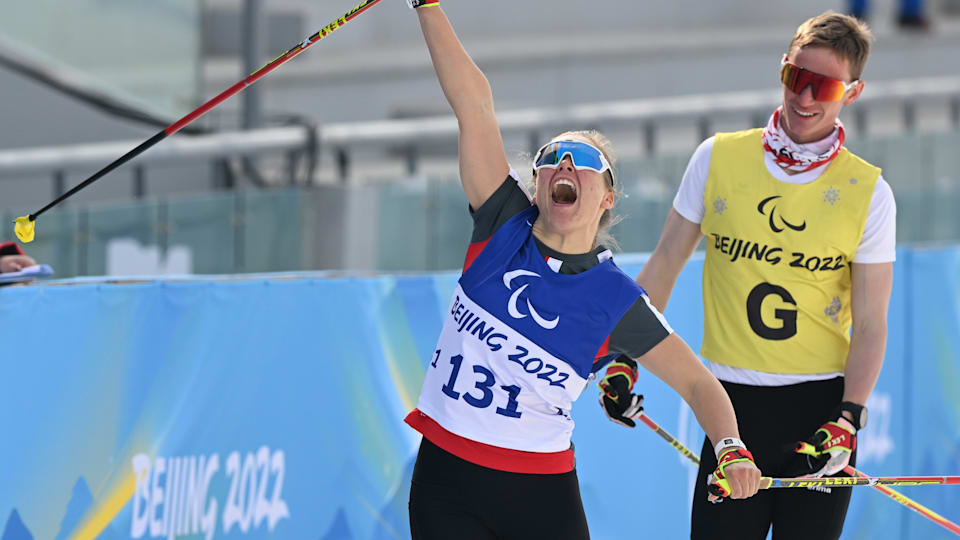Carina Edlinger gets gold with a little help from her friends and dog
The Austrian visually impaired skier overcame mobility challenges to finally get her hands on gold in the women's cross-country skiing sprint event. She credits guide dog Riley for helping her on the way to the top of the podium.

Reaching the Paralympics alone signifies a triumph of the human spirit. Austrian visually impaired skier Carina Edlinger did that and then some, overcoming additional obstacles en route to her maiden gold medal at the Paralympic Winter Games Beijing 2022.
Two days before she produced the greatest result of her career in the women's cross-country skiing sprint event, Edlinger was unable to move her body, let alone race against the best athletes in the world.
But the 23-year-old made a remarkable recovery and was overwrought with emotion when she received her gold medal, letting out a loud scream of delight before breaking down in tears.
Receiving the gold medal represented a moment of catharsis for Edlinger, who had to overcome desperate lows where she looked set to leave her second Paralympics empty-handed. Edlinger failed to finish the Para biathlon sprint and the long-distance cross-country event because of severe pain, with the condition going from bad to worse.
"A few days ago (on Monday), I was completely paralysed below the neck, lying on the wax cabin floor. That was one of the lowest points I've had in my sports life," said Edlinger.
Freaking amazing
Edlinger said she had similar mobility issues four years ago in PyeongChang, where she walked away with a bronze medal. She came into Beijing 2022 as one of the favourites – as in 2018 – but her hopes of finally translating promise into gold was fast dissipating.
"It's kind of frustrating when you're 23 years old, and someone has to feed you or change your clothes," she said.
"That's so far away from sports, when you should focus on something else, and I was questioning myself once again, 'Does it make sense that I'm still competing at such a level and not just focus on the health?' But the victory today was quite healing."
With the help of her support team, including physiotherapist and guide Lorenz Lampl, she was able to line up for Wednesday's racing. The determined Austrian got the day off to an impressive start winning her qualifying round without Lampl at her side. In the semi-finals and final, Lampl either skied behind or next to Edlinger instead of in front of her as is the norm.
"With two times not finishing, that was more than frustrating because I knew what I could do. But today, winning gold like this is freaking amazing," she said.
"I knew I came here as one of the big favourites, and it's a big relief to win here today. And to win together (with Lampl), it's even nicer to share the thing.
"My ambition was always that if I can't win the skating sprint, I should retire. So it's better that I win that one, it's just amazing."
Riley and me
Edlinger credited her guide dog, Riley, for part of her success not only by improving her mobility but providing companionship.
"For me, the most important thing coming to China was to bring my dog. If my dog would not have been able to enter China, I would directly fly home," Edlinger said.
"So it wasn't the easiest task for the (International) Paralympic Committee with me. My dog is a guide dog. I see between 1.5 and 2 per cent, so I am probably the most low-vision athlete who is competing here, so it's kind of tricky, but he helped me – not only to find my ways but also emotionally over the past couple of days."
When the four-time vision impaired world champion is not in chasing silverware, she is looking for stories as a budding journalist.
Edlinger is studying sports journalism but has found it challenging to secure an internship which is a crucial step towards graduating.
"Most of them just see your disability," she said. "With a vision impairment, the first thing you're going to hear is 'no' because everyone thinks it's impossible.
"When you say, 'I want to work as a journalist, they can't even imagine it. They're not even giving you a chance. In my mind, everything is possible. As long as there is a will, you will always find a way."
Edlinger is one step closer to realising her dream courtesy of the International Paralympic Committee (IPC) which has allowed her to write and publish feature articles on its website. She hopes the opportunity will kickstart her journalism career that is sure to take off if her Paralympic success is anything to go on.
